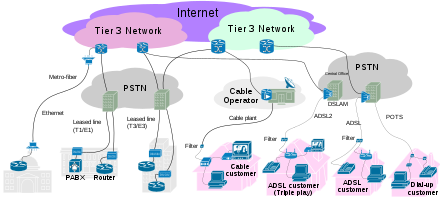"Internet service" redirects here. It is not to be confused with
Web service.

Internet connectivity options from end-user to tier 3/2 ISPs
An
Internet service provider (
ISP) is an organization that provides services accessing and using the
Internet. Internet service providers may be organized in various forms, such as commercial,
community-owned,
non-profit, or otherwise
privately owned.

Local ISP in Manhattan installing fiber for provisioning Internet access
History[edit]
The Internet was developed as a network between government research laboratories and participating departments of universities. By the late 1980s, a process was set in place towards public, commercial use of the Internet. The remaining restrictions were removed by 1995, 4 years after the introduction of the
World Wide Web.
[1]
In 1989, the first ISPs were established in Australia
[2] and the United States. In Brookline, Massachusetts,
The World became the first commercial ISP in the US. Its first customer was served in November 1989.
[3]
On 23 April 2014, the U.S.
Federal Communications Commission (FCC) was reported to be considering a new rule that will permit ISPs to offer content providers a faster track to send content, thus reversing their earlier
net neutrality position.
[4][5][6] A possible solution to net neutrality concerns may be
municipal broadband, according to
Professor Susan Crawford, a legal and technology expert at
Harvard Law School.
[7] On 15 May 2014, the FCC decided to consider two options regarding Internet services: first, permit fast and slow broadband lanes, thereby compromising net neutrality; and second, reclassify broadband as a
telecommunication service, thereby preserving net neutrality.
[8][9] On 10 November 2014, President
Barack Obamarecommended that the FCC reclassify broadband Internet service as a telecommunications service in order to preserve
net neutrality.
[10][11][12] On 16 January 2015,
Republicans presented legislation, in the form of a
U.S. Congress H.R. discussion draft bill, that makes concessions to net neutrality but prohibits the FCC from accomplishing the goal or enacting any further regulation affecting Internet service providers.
[13][14] On 31 January 2015,
AP News reported that the FCC will present the notion of applying ("with some caveats")
Title II (common carrier) of the
Communications Act of 1934 to the internet in a vote expected on 26 February 2015.
[15][16][17][18][19] Adoption of this notion would reclassify internet service from one of information to one of the
telecommunications[20] and, according to
Tom Wheeler, chairman of the FCC, ensure
net neutrality.
[21][22] The FCC is expected to enforce net neutrality in its vote, according to the
New York Times.
[23][24]
Upon becoming FCC chairman in April 2017,
Ajit Pai proposed an end to net neutrality, awaiting votes from the commission.
[35][36] On 21 November 2017, Pai announced that a vote will be held by FCC members on 14 December on whether to repeal the policy.
[37]


